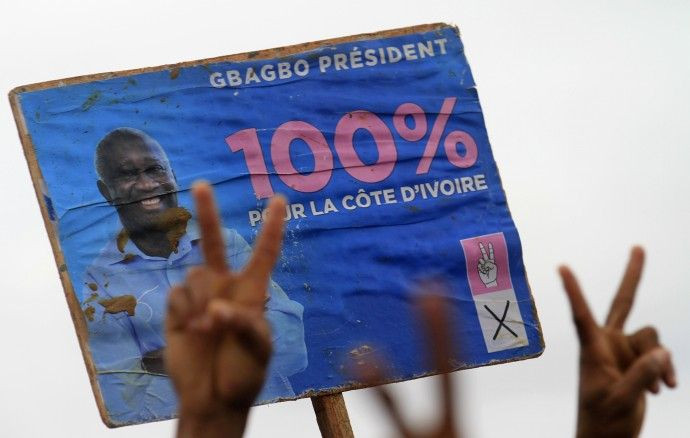Leaders unwilling to concede defeat hinder Africa's path to democracy

Burning tyres, rebel checkpoints, an angry mob and a placard that reads, Gbagbo thief... The West African state of Ivory Coast seems to be rapidly descending into a state of crisis. Acknowledged as the most expensive polls in Africa, the recent run-off was aimed at unifying the country which suffered bitter divisions and wrath of an armed uprising in 2002. But instead, they bared the discrepancy within the nation's population.
Leaders of the former French colony now join the exclusive club of African politicians who are unwilling to relinquish the obsession with authority. Likely on cards, as it happens in the continent, is an unwholesome power-sharing deal, an agreement that could only protract the instability in the region.
Ignoring calls to maintain calm, both Laurent Gbagbo, the incumbent president and opposition leader Alassane Ouattarra appointed their own prime ministers and cabinet, claiming victory in the run-off. Local media reports suggested that at least 18 people have been killed so far in violent clashes between both parties.
The Independent Electoral Commission (IEC) last week declared Ouattara to have won the run-off by 54.1 per cent of votes to 45.9 per cent. But the country's Constitutional Council named Gbagbo as winner overturning the earlier results. The president of the council, Paul Yao N'Dre, stated that after excluding votes in seven regions (controlled by the rebel forces) that were marred by irregularities, Gbagbo won the polls by 51 per cent to Ouattara's 48 per cent.
The United Nations, US, France and other European countries supported Ouattara as President and asked Gbago to step down. Yet the defiant leader had sworn himself as premier for the third consecutive term.
The international community does not choose for the Ivorians, Pierre Kipre, the country's ambassador to France, stated in an interview with Europe1.
Let the Ivorians make their own decision, he added.
But hinting a crackdown on the opposition, he maintained that it was essential for the Ivorian army to provide security.
Borders still remain sealed off while the army, which is backing Gbagbo, is reportedly moving towards securing the region. Conversely, in the northern half of the country, rebel 'New Forces', that have been backing Ouattarra, are leading the protest against Gbagbo and his men. Text messages have been reportedly blocked while foreign news agencies speaking in support of Ouattara have been taken off the air.
'Mediations have begun after another bad election in Africa,' a news report in African media read on Monday. A day earlier, the African Union had dispatched Thabo Mbeki, the former South African President, to the country seeking to clam the escalating tensions. But for the South African leader, this decade is unlike the late 1980s. The man, who once led the clandestine mediations that apparently brought down the Apartheid regime in South Africa, is now left hot and bothered across the negotiating table.
Mbeki earlier tried to mediate between clashing parties in both Sudan and Zimbabwe but met with little success. Power-sharing deals between rival groups over the past decade fell apart, with some almost on the verge of collapse. Such deals, which are on offer in Ivory Coast, have now been rendered ineffective by observers.
Zacob Zuma, the President of South Africa, was rushed to Harare last month to save the unity deal between rival groups of Prime Minister Morgan Tsvangirai and ruling president Robert Mugabe. The PM filed a lawsuit against the President accusing him of violating political agreement signed between them. The move paralyzed the coalition government forcing both sides to call for early elections next year. Observers are warning that the violence could return to the region as a result.
Former U.N. Secretary General Kofi Annan also mediated an agreement in Kenya after violence followed the country's election. Incumbent President Mwai Kibaki was accused of irregularities in the polls, but he had soon sworn himself as President. Clashes that erupted across Kenya killed more than 1,300 people and forced rival leaders to come to the table. Recent politics surrounding the International Criminal Court's probe into the election violence in 2007 are also likely to undermine the power-sharing pact.
Feuding factions in Ivory Coast might fail to find long-term peace in the country despite agreeing to a power-sharing deal. Gbagbo himself rose to power after he contested former President Robert Guei's claims of election victory in October 2000.
Analysts suggest that the current mediations, unlike the earlier attempts, should be aimed at breaking the trend rather than forcing rival groups to agree on a deal. Some suggest that in order for African states to progress as democracies, the leaders should learn and be trained on how to concede a defeat.
© Copyright IBTimes 2024. All rights reserved.





















